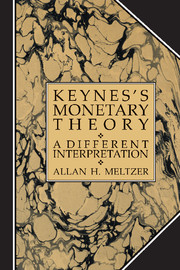Book contents
- Frontmatter
- Contents
- Preface
- 1 Introduction
- 2 Keynes in the 1920s: ideas, beliefs, and events
- 3 Theories, implications, and conjectures in the 1920s
- 4 The General Theory: a different perspective
- 5 Monetary reform and international economic order
- 6 Other interpretations of the General Theory
- 7 Conclusion
- References
- Index
5 - Monetary reform and international economic order
Published online by Cambridge University Press: 05 September 2009
- Frontmatter
- Contents
- Preface
- 1 Introduction
- 2 Keynes in the 1920s: ideas, beliefs, and events
- 3 Theories, implications, and conjectures in the 1920s
- 4 The General Theory: a different perspective
- 5 Monetary reform and international economic order
- 6 Other interpretations of the General Theory
- 7 Conclusion
- References
- Index
Summary
Never in history was there a method devised of setting each country's advantage at variance with its neighbours' as the international gold … standard … The part played by orthodox economists … has been disastrous … For when in their blind struggle for an escape, some countries have thrown off the obligations which had previously rendered impossible an autonomous rate of interest, these economists have taught that a restoration of the former shackles is a necessary first step to a general recovery. (7, p. 349)
Keynes rarely overlooked an opportunity to criticize the classical gold standard. The main point of his criticism changed, however, in parallel with the development of his ideas. The mature Keynes, as in this quotation, gave two main reasons why the gold standard is not a welfare maximizing arrangement. First, countries cannot reduce unemployment by expanding domestic demand. They must compete for exports to acquire gold and increase money. Their gain is at the expense of another country (or other countries) that loses gold and must contract. Second, the classical gold standard prevents a country from independently lowering its interest rate. Keynes often wanted a zero rate of interest, and certainly a permanently lower rate of interest, to increase investment, the capital stock, and per capita income.
The association of Keynes with closed-economy macroeconomics, in which money “does not matter,” is one of the great anomalies in the history of economics.
- Type
- Chapter
- Information
- Keynes's Monetary TheoryA Different Interpretation, pp. 205 - 248Publisher: Cambridge University PressPrint publication year: 1989

